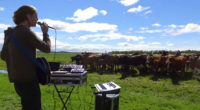
This year’s Icelandic selection, Söngvakeppnin 2013 finally got underway tonight and what a way to start proceedings! A number of big names lining up to participate, practically guaranteed a fantastic show for fans, but how would the public decide?
Tonight’s was the first and without doubt the most difficult of the two semis this weekend, with numerous big names eyeing a place in the final. Established artists such as Magni will face fierce competition from two former Eurovision entrants, namely Birgitta and Jóhanna. But being a household name isn’t synonymous with success and doesn’t neccessarily translate into votes, as last year’s second placed Blár Ópal proved, making tonight’s heat all the more exciting.
The songs (You can read more about these participants in our Get To Know article)
Song number 1: Jóhanna Guðrún Jónsdóttir – Þú/You (Music and Lyrics: Davíð Sigurgeirsson)
Ballad be gone! Jóhanna has ditched what she does best, delivering epic balladry and has instead gone for the spritely, country tinged Þú to open the show. A great draw, and Jóhanna performs with great gusto. The stage was awash with shades of orange, reflecting off Jóhanna’s short gold dress worn over a black sleeveless top and leggings. She was accompanied by 4 backing singers, 3 female and 1 male as well as a guitarist. The stage was used to it’s full extent, with plenty of wandering around,and Jóhanna flirted plenty with the camera. Despite a stellar performance with crystal clear vocals, it still came across as rather flat although Jóhanna evidently enjoyed herself.
Nevertheless, there is still something lacking here and it may be just a little too run of the mill to grab the viewers’ vote.
Song number 2: Magni Ásgeirsson – Ekki Líta Undan/Don’t Look Away (Music: Sveinn Rúnar Sigurðsson / Lyrics: Ingibjörg Gunnarsdóttir)
Magni is back for the third year in a row, sticking to what he does best – adult rock. Coming tantalizingly close the previous two years, many are asking if this might finally be Magni’s year. A delectable opening swathed in strings before the driving rhythm kicks in and we are treated to the usual empassioned vocals we’ve come to expect. Magni opened his number standing in darkness, with a single spot lighting up where he stood, before the stage burst into a myriad of colour, mainly blues and whites, beams flashing everywhere. He was dressed soberly in black trousers and plain black blazer with a t-shirt underneath. From the moment he took to the stage, Magni owned it, giving a strong, confident performance, where he veritably attacked his vocals with almost a sense of urgency. This was a fantastically dramatic number, with the strings and the backing vocals coming in at the end merely heightening the effect and was very well recieved by the audience.
Song number 3: Svavar Knútur Kristinsson and Hreindís Ylva Garðarsdóttir Hólm – Lífið Snýst /Life Goes On (Music: Hallgrímur Óskarsson / Lyrics: Hallgrímur Óskarsson & Svavar Knútur Kristinsson)
Next up is what sounds a bit like a nursery rhyme. A very playful, well structured song that is simple enough to hum along to. The voices of Svavar and Hreindís go very well together and the song emanate quite an infectious, happy vibe, but resorting to the dreaded "la, la, la" to finish a song is, to put it mildly, a bit too weak and does indeed belong in a nursery.
Yellow was the colour of the their act, which wasn’t exactly easy on the
eye, but kept in line with the summery feeling of the song. The duo were
backed by four musicians. Svavar Knútur was dressed in shirt and brown
waistcoast, complete with bow tie and Hreindís Ylva in a simple yet
elegant flesh coloured dress. Svavar Knútur also contributed on the
eukelele, Hreindís Ylva on the tambourine.
The vocals were fine,
no major issues there, but then again it isn’t exactly a challenging
melody. Both sounded as good live as they did on the recorded version.
The performance may have lacked finesse and routine compared to other
contenders, but more than made up for it in charm but still came across as a number you’d find at an end of term school recital.
Song number 4: Edda Viðarsdóttir – Sá sem Lætur Hjartað Ráða För/The One Who Follows His Heart (Music: Þórir Úlfarsson / Lyrics: Kristján Hreinsson)
One of the few ballads on offer tonight by the unknown Edda Viðarsdóttir. Orange was the principal theme again for Edda’s performance, and complemented her gold dress perfectly. She was accompanied by three male backing singers and a guitarist all dressed in black as well as a woman to her side who told the song’s text in sign language. She seemed extremely nervous at times during her performance, with some notes veering off key and sounding ever so nasal – this was without doubt the weakest vocal performance of the evening and couldn’t be over quick enough. The song lacks direction if anything and is perhaps a bit too anonymous for viewers to vote for en masse. It was bizarrely enough greeted enthusiastically by the audience. Hardly think this will be a challenger tonight.
Song number 5: Eyþór Ingi Gunnlaugsson – Ég á Líf/I’ve Got a Life (Music & Lyrics : Örlygur Smári & Pétur Örn Guðmundsson)
Next up is a highly regarded entry, with great expectations to do well – a rousing, classic piano led ballad with clear Celtic influences which carries Eyþór Ingi voice to great effect. Quite suprising to think that Örlygur Smári has previous entries such as This Is My Life and Je Ne Sais Quoi to his name. Blacks and blues along with a starry sky were the backdrop for Eyþór Ingi, his long blond locks standing out against the dark stage. He stood alone without any gimmicks in a plain black suit and gave a very emotive performance, with plenty of gesturing, showing he really knew how to work the camera. Perhaps he was aware of the positive buzz his song hade been creating prior to the contest. Right before the key change and key celtic fiddles, an explosion of bright white beams lighting him up from behind, arms outstretched, he really gave his all for Eg á Líf and the audience were whooping and screeching by the end of it. Can definitely not be ruled out as a challenger tonight.
Song number 6: Birgitta Haukdal – Meðal Andanna/Among the Spirits (Music: Birgitta Haukdal, Sylvía Haukdal Brynjarsdóttir & Jonas Gladnikoff / Lyrics: Birgitta Haukdal, Sylvía Haukdal Brynjarsdóttir, Michael James Down & Primoz Poglajen)
And so we come to the final act of the night, former Eurovision entrant Birgitta, with the second big ballad of the evening. Where did the evening go to? It seems to have flown by! A dreamy backdrop featuring blue clouds accompanied the haunting opening of the song. Birgitta stood alone wearing a floor length, flowing white gown with beadwork on the bodice. She walked around stage, giving some intense looks into the camera in an attempt to engage the viewers. She was suddenly joined by four backing singers wearing hooded monk’s robes. Meðal Andanna is a no nonsense power ballad with elements of
folk music. As the melody progresses however, it rapidly becomes a bit Eurovison by numbers, slightly outdated, predictable and
formulaic with everything where it’s supposed to be, including wind machine and will no doubt be
lapped up by the punters. It was clear enough to hear that Birgitta certainly wasn’t lacking experience in the performance department, and in general gave a convincing performance, even though it came across slightly screechy towards the end. It would be very suprising if Birgitta isn’t among the three to make the final tonight.
The show:
The show got off to a sneak start, with a twenty minute warm up programme taking a look back at Icelandic history in the contest before Þórhallur Gunnarsson and Guðrún Dís Emilsdóttir welcomed us to the first of two shows before seven finalists will take to the stage at the Harpa Concert Hall on Saturday, 2nd of February. Both entered the stage wearing basic black against the stage which was bathed in the signature lilac colour of the contest. In between performances, we were taken back stage to the green room, where we got to meet Jóhanna and Magni before Svavar Knútur and Hreindís Ylva entered, fresh from the stage, clearly ecstatic. Jóhanna on the other hand, told of how nerve wracking it had been to perform tonight.
Viewers were treated to stunt reports from back stage and during the rehearsals, with a montage featuring all of this evening’s participants, before we were greeted back on stage by the hosts who were joined by singer Guðrún Gunnarsdóttir, who backed Inga on keyboards in Millstreet in 1993. Journalist and Eurovision fan Gunnar Hjálmarsson joined her as guest on stage to share with viewers their opinions on the contest in a chat show format. We were then treated to a musical interlude featuring members of Blár Ópal giving us their rendition of an acoustic version of the very first Icelandic entry, Gleðibankinn, which came 16th for Iceland back in 1986.
The voting/result:
Telephone lines were opened as soon as the sixth and final act was finished. And so, results time. Three envelopes were given to the hosts. The first name to be called up was Birgitta, which was hardly a big surprise. The second name to be announced was the major suprise of the night, with Svavar Knútur Kristinsson and Hreindís Ylva Garðarsdóttir Hólm given the second spot in the final. The third and final name to advance to the final was indeed Eyþór Ingi. Big surprises in little Reykjavík tonight, with both Jóhanna and Magni so far failing to make the final, unless one of them is given the wildcard by RÚV.
The three qualifiers from this first heat are:
-Birgitta Haukdal
–
Svavar Knútur Kristinsson and Hreindís Ylva Garðarsdóttir Hólm
–
Eyþór Ingi Gunnlaugsson
Iceland at the Eurovision Song Contest:
One of the smallest countries in Europe, Iceland, has been a part of the Eurovision family since their debut back in 1986 with Icy and Gleðibankinn. Since then, broadcaster RÚV has sent many entries to Eurovision that, although failing to make an impact have become firm fan favourites, such as Páll Óskar and Minn Hinsti Dans with his daring presentation and choreography from 1997 or the little lady with the huge voice Sigga and her entry Nætur from 1994. We only have to go as far back as to 2009 to find the best Icelandic placing, which Jóhanna was responsible for, coming second with the melancholic ballad Is It True? Prior to that, Iceland have another silver medal as a result of Selma‘s joyous stage performance with All Out Of Luck in 1999. Other than that, Iceland have three top ten placings to their name and have qualified to the final for the last five years.
You might also want to read:



















